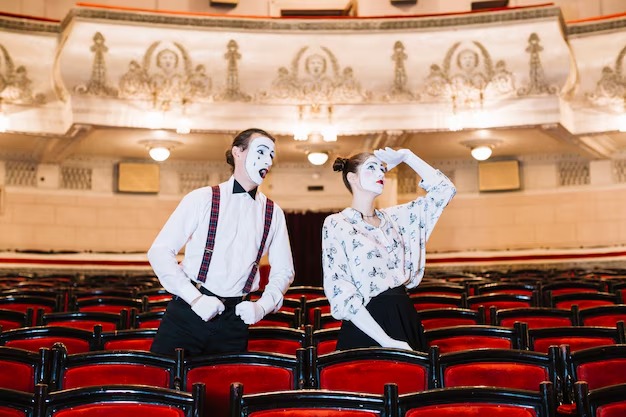
23 December 2024
Exploring Dystopian Operas A Beginner Guide to the Red Rising

For aficionados of dramatic expression and soulful melodies, immersing oneself in tales woven through the artistry of theater stands as an unforgettable experience. This journey into the realm of stagecraft brings to light extraordinary stories that captivate audiences, resonating with the heart and soul of a vibrant metropolis. Each performance combines intricate storytelling with mesmerizing compositions, creating a unique atmosphere that enchants spectators.
With a rich tapestry of settings and themes, these performances offer glimpses into the human condition, echoing emotions and experiences that transcend time and geography. From grand palaces to quaint venues, the experiences unfold in spaces alive with history, providing a backdrop that enhances the artistry presented. Each event serves not only as entertainment but as a celebration of creativity and passion.
Join in exploring remarkable narratives that highlight the intricate relationship between location and artistry. Whether seeking timeless classics or innovative interpretations, the charm of these captivating shows invites all to partake in an exhilarating cultural experience, leaving an indelible mark on those who attend.
In the realm of classical music and theatrical performances, certain productions stand out as essential experiences. These masterpieces not only showcase extraordinary talent but also offer a glimpse into the rich tapestry of historical and cultural narratives. Attending these productions allows one to immerse themselves in vibrant storytelling through mesmerizing melodies and powerful performances.
One exemplary work that captivates audiences is Benjamin Britten’s “Peter Grimes”. Set against the backdrop of a coastal village, this opera explores themes of isolation and societal judgment, beautifully illustrated through haunting music and compelling character arcs.
Another remarkable piece is Giacomo Puccini’s “La bohème”, which paints a poignant picture of love and heartbreak among young artists in a vibrant urban setting. Its lush score and relatable characters have made it a timeless favorite among opera lovers.
Lastly, Henry Purcell’s “Dido and Aeneas” offers a baroque journey through love and loss, featuring stunning arias and a dramatic narrative that resonates deeply with audiences, showcasing the poignant beauty of English operatic tradition.
Each of these productions provides a unique opportunity to experience the power of live performance, making them essential for anyone seeking an enriching and unforgettable evening in the world of classical music.
Opera holds a prominent position within the vibrant tapestry of artistic expression found in this bustling metropolis. It serves as both a reflection of society’s values and a conduit for profound emotional experience. Throughout history, this musical form has managed to captivate audiences, fostering a deeper appreciation for the performing arts and connecting communities through shared experiences.
From grand productions to intimate performances, operatic works have provided a platform for exploring complex themes and social issues. The rich history of this art form here has influenced not only local traditions but also international trends within the genre, making it a significant cultural touchstone.
| Period | Influence | Notable Works |
|---|---|---|
| 17th Century | Establishment of opera houses | Henry Purcell’s “Dido and Aeneas” |
| 19th Century | Growth of Romantic operas | Giuseppe Verdi’s “Rigoletto” |
| 20th Century | Modern adaptations and themes | Britten’s “Peter Grimes” |
Through these powerful narratives and stunning musical compositions, opera continues to enrich the cultural landscape, inviting both contemplation and enjoyment. It is a vital part of this city’s identity, fostering dialogue and interaction among audiences from diverse backgrounds while celebrating its historical roots.
Exploring beloved locations where enchanting melodies and dramatic narratives come alive creates unforgettable experiences for fans of this timeless art form. These iconic places offer not only stunning performances but also rich histories, impressive architectures, and vibrant atmospheres that elevate every visit.
Royal Opera House, situated in Covent Garden, serves as a premier destination for aficionados. Home to both opera and ballet, this majestic venue boasts a unique blend of tradition and innovation. Visitors can immerse themselves in spectacular productions while enjoying its stunning interiors and exceptional acoustics.
Another remarkable place is the English National Opera, located at the London Coliseum. Renowned for its commitment to accessibility and diverse repertoire, this establishment attracts diverse audiences. Each performance showcases world-class talent and celebrates a rich array of operatic styles, appealing to both seasoned attendees and newcomers alike.
Throughout history, numerous influential composers have drawn inspiration from this vibrant city, shaping their music and leaving a lasting impact on the world of performing arts. These musical maestros found in the streets, culture, and essence of the metropolis a wellspring of creativity that fueled their compositions. The relationship between these artists and the city highlights a unique blend of local traditions and universal themes.
Benjamin Britten stands out as one of the most notable figures in British music, with many works showcasing his profound connection to the urban landscape and its people. His operas often reflect the social fabric of society, emphasizing human emotions and relationships.
Henry Purcell, another eminent composer, made his mark in the 17th century, capturing the spirit of his times through rich melodies and compelling narratives. His contributions to music not only illustrate his genius but also mirror the dynamic cultural scene of that era.
Giuseppe Verdi, while primarily associated with Italy, had a significant impact on the musical life of the city, performing and inspiring local musicians. His works transcended national boundaries, resonating deeply with audiences and leaving a profound legacy.
These luminaries, among others, carved their names into the annals of musical history, inspired by a city that pulsates with artistic energy. Their legacies continue to inspire modern composers and musicians across the globe.
Capital’s operatic works are characterized by a rich tapestry of tradition and innovation. These compositions reflect a distinctive blend of historical significance and contemporary creativity, encapsulating diverse narratives that resonate deeply with audiences. The vibrant cultural landscape serves as a backdrop, enhancing the emotional depth and thematic complexity presented on stage.
Timeless stories are interwoven with local landmarks and events, offering an immersive experience that transcends time. Whether inspired by regal events or everyday life, these performances often draw on iconic figures and locales, making them relatable yet grand. The historical context breathes life into operatic themes, allowing spectators to engage with familiar settings that evoke a sense of place.
Composition styles in this arena often showcase a fusion of genres, pushing boundaries and challenging conventions. Contemporary works frequently incorporate elements from various musical traditions, creating a unique soundscape that captivates both seasoned and new audiences. This innovative approach not only honors classical roots but also embraces modern influences, establishing a dynamic art form that evolves with time.
This year promises an exciting lineup of performances that will captivate audiences and showcase incredible talent. Each presentation brings unique stories and innovative interpretations, making them must-see events for those passionate about the art form.
Mark your calendars and prepare to indulge in the rich narratives and thrilling performances that await in the coming months!
The Metropolitan Opera, founded in 1883, is one of the most prestigious opera companies in the world. It began as a response to the need for a new opera house in New York City and has since become a cultural landmark, known for its grand productions and world-class artists.
The Metropolitan Opera is located at Lincoln Center for the Performing Arts in New York City. The venue, known as the Met, features a stunning auditorium and state-of-the-art facilities, making it a premier destination for opera lovers.
The Metropolitan Opera has hosted numerous legendary performers, including Luciano Pavarotti, Maria Callas, and Plácido Domingo. These artists have contributed to the Met’s reputation for excellence and have left a lasting legacy in the world of opera.
Audiences at the Metropolitan Opera can expect a diverse range of productions, including classic operas by composers such as Verdi and Puccini, as well as contemporary works by modern composers. The Met aims to provide a well-rounded operatic experience that appeals to various tastes.
The Metropolitan Opera engages with the community through educational programs, outreach initiatives, and live broadcasts. These efforts aim to make opera more accessible and foster a love for the art form among diverse audiences.
The Met’s Live in HD series is significant as it broadcasts performances to cinemas around the world, allowing audiences who cannot attend live performances to experience opera. This initiative has expanded the reach of the Metropolitan Opera and introduced new fans to the art form.
The Metropolitan Opera supports emerging artists through various programs, including young artist training programs and competitions. These initiatives provide valuable opportunities for talented singers and musicians to develop their skills and gain exposure in the operatic world.
Technology plays a crucial role in productions at the Metropolitan Opera, enhancing visual effects, sound quality, and stage design. The Met utilizes advanced lighting, projection, and sound systems to create immersive experiences that captivate audiences.
The Metropolitan Opera selects its repertoire each season based on various factors, including audience demand, artistic vision, and historical significance. The programming aims to balance beloved classics with innovative new works that challenge traditional operatic boundaries.
In recent years, the Metropolitan Opera has faced challenges such as financial constraints, competition from other entertainment forms, and the impact of the COVID-19 pandemic. The Met continues to adapt its strategies to ensure sustainability while maintaining its artistic integrity.
The new production of Tchaikovsky’s opera at the Met’s 2024–25 season is highly anticipated as it marks a return to the Met for this rarely performed work. Conducted by Yannick Nézet-Séguin, it promises to showcase the dramatic powers of the orchestra and feature beloved melodies that resonate with audiences of all ages.
Ailyn Pérez will perform the title role in the new production of Puccini’s opera, bringing her acclaimed vocal prowess to this beloved character. Her performance is expected to be one of the highlights of the season, especially alongside other opera stars like soprano Sondra Radvanovsky.
The company premiere of Kaija Saariaho’s opera will be led by music director Yannick Nézet-Séguin. This world premiere is part of a program featuring new works that aim to pay tribute to contemporary operatic compositions and expand the repertoire presented at the Met.
Michael Mayer and Claus Guth are collaborating on a new production that will headline the 2023 season. Their creative partnership aims to bring fresh interpretations to classic operas, ensuring that they resonate with modern audiences while maintaining the lyrical essence of the original works.
J’nai Bridges will take on a significant role in the upcoming performances, showcasing her talents as a baritone in a highly anticipated production. Her involvement in this production is expected to highlight her dramatic abilities and contribute to the overall success of the season.
The Met plans to engage audiences of all ages through diverse programming that includes one-act operas and abridged versions of classic works. This approach allows families and younger audiences to experience opera in a more accessible format, fostering a love for this art form.
Tenor Pene Pati will be performing throughout the 2024–25 season, contributing his powerful voice to various productions. His performances are expected to captivate audiences, particularly in roles that showcase his lyrical style and emotional depth.
Notable performers joining Elīna Garanča include sopranos Ailyn Pérez and Gabriella Reyes, as well as tenor Brandon Jovanovich. Their collective talent promises to create memorable performances that highlight both individual artistry and ensemble dynamics.
John Adams’ new work featured this season will explore themes of love triangles and human emotion, set against a backdrop of historical narratives. The production aims to resonate with contemporary issues while drawing from rich operatic traditions.
The Met plans to honor its legacy by balancing classic operas by composers like Mozart and Strauss with new works from contemporary composers such as Kaija Saariaho and John Adams. This strategy allows the company to maintain its historical roots while also embracing innovation and creativity in opera.
Leave a comment